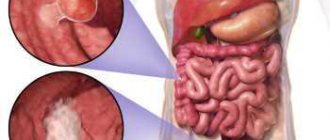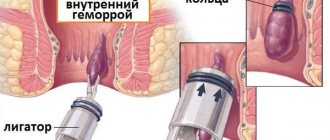Rectal polyps are benign formations, and in appearance they resemble neoplasms that arise on the intestinal mucosa. To date, the reasons why this pathology occurs have not been established, but statistics say that they are more often diagnosed in people suffering from inflammatory bowel diseases, chronic constipation, and diarrhea.
There are also no age or gender differences in intestinal polyposis - the disease is found with equal frequency in women and men; there are also hereditary forms of the disease - diffuse familial polyposis, which are detected already in adolescence.
Signs, symptoms and consequences of rectal polyps
A polyp is a growth of epithelial, glandular or connective tissue, localized in hollow internal organs. When this benign formation is formed in the rectum, the patient does not actually feel any unpleasant symptoms, but this in no way indicates that the polyp is harmless.
All rectal polyps today are classified as precancerous conditions. In most cases, their appearance is preceded by inflammatory bowel diseases, accompanied by persistent stool disorders.
The main symptoms of the pathology are:
- mucus discharge with feces;
- irregular appearance of blood in the stool;
- spasms and pain in the intestines (these symptoms appear when the polyps are large and partial intestinal obstruction occurs).
But most often, intestinal polyps are asymptomatic, i.e. clinically manifest when they reach large sizes or degenerate into intestinal cancer. In this regard, for the early diagnosis of intestinal polyps, it is recommended to perform an immunochemical stool occult blood test (for example, the ColonView test) annually.
When they appear, you need to contact a coloproctologist for a detailed examination, after which preparations will begin to remove the polyp in the rectum using one of the methods.
Possible complications
If the recommendations or individual characteristics of the body are not followed, symptoms such as:
- high body temperature;
- pain in the lower abdomen;
- edema;
- bloody discharge in the stool;
- nausea, vomiting.
Symptoms indicate the occurrence of complications or inflammation at the site of polyp removal. The reason is deviations from the doctor’s recommendations. You should immediately visit a doctor to take measures to relieve negative symptoms.
Removing polyps surgically is an effective and reliable remedy. In Moscow, the cost of the procedure is low. Ignoring the problem leads to serious consequences, including forced removal of the rectum. Eliminating complications will cost significantly more than eliminating them at an early stage. It is recommended to remove polyps immediately after detection.
Causes of polyps
There is no reliable data on the causes of polyps in the rectum, but it is known that polyps never form on an absolutely healthy intestinal mucosa. In most cases, they form after chronic or acute pathologies of the colon and rectum, after intestinal infections, as well as systematic errors in nutrition, which cause constipation. Heredity also plays an important role in their formation - polyps are often diagnosed in relatives of those who have encountered such a problem.
Restrictions
Any surgical intervention places certain demands on the body’s condition so that it can withstand the load. Surgery is not recommended for patients:
- with diabetes mellitus;
- epilepsy;
- infectious diseases;
- cardiac disorders requiring wearing a pacemaker;
- acute inflammation of the intestinal wall at the site of manipulation - this can cause end-to-end damage.
The patient must warn the attending physician about all the features of his body in order to prevent unpleasant consequences. Even a small detail can play an important role in treatment. If there are contraindications to intervention, drug therapy (tablets, ointments, suppositories) and physiotherapeutic procedures are prescribed. Sick leave is issued for the duration of treatment. If there are no contraindications, then surgery is prescribed.
Treatment methods for rectal polyp
Drug therapy for rectal polyps is not used due to ineffectiveness. When these benign neoplasms are detected, specialists prefer to remove polyps in the rectum using one of the surgical or minimally invasive methods widely used in modern proctology:
- endomicrosurgical excision of polyps;
- excision of polyps using a rectoscope or colonoscope - polypectomy;
- removal of a polyp by coagulation of its stalk (laser or argon plasma);
- resection of part of the intestine - practiced with multiple formations;
- transanal removal of polyps in the rectum
Moreover, in addition to the classic scalpel, high-tech techniques are used to remove benign formations in the intestines - laser, electrocoagulation, radio wave scalpel, as well as an “electric loop”.
Endomicrosurgical removal of polyps
Endoscopic surgery to remove a rectal polyp using a proctoscope - an instrument inserted into the rectal cavity and equipped with a light bulb and a tube for supplying carbon dioxide. The design of the device is designed in such a way that the supplied gas expands the intestinal cavity, and the light source illuminates it, which allows the doctor to visualize the formation.
In addition, a camera is installed on the proctoscope to transmit an enlarged image to the screen. The actual operation to remove the rectal polyp is performed using surgical endoscopic instruments.
Advantages of this method:
- the ability to remove a polyp from any area and/or layer of the rectal mucosa;
- the ability to stop bleeding using coagulation;
- the ability to remove a polyp without dividing it into several parts.
The method is used for almost any type of polyp.
Polyp removal using electroexcision
Electroexcision, also known as electroloop, is performed using a proctoscope. The main instrument is a device at the end of which there is a thin metal thread in the form of a loop. During the procedure, it is draped over the polyp and tightened so that it tightly clasps the stalk of the formation, and after that the power supply is turned on so that the loop heats up. Further tightening of the loop leads to the intersection of the polyp stalk and sealing of the blood vessels.
Advantages of the method:
- no or very low risk of bleeding;
- speed of the operation.
The method is suitable for removing polyps with a “pedicle” with a diameter of up to 30 mm, located at a small (up to 30 cm) distance from the anus.
Rectal resection
Direct resection is performed if the polyps show signs of becoming malignant and there is histological confirmation of the diagnosis. As a rule, such operations are performed for malignant polyps and large villous polyps. The operation is performed under general anesthesia. In recent years, laparoscopic resection of the rectum along with the polyp has become widespread.
Laser polyp removal
Removal of a rectal polyp with a laser is carried out in two ways - coagulation of the polyp or its excision. In the first case, the procedure is performed under local anesthesia, in the second - under general anesthesia.
Laser coagulation of rectal polyps is a layer-by-layer cauterization of neoplasms. Excision is a classic polypectomy using not a conventional, but a laser scalpel.
The advantages of laser removal are the low risk of bleeding.
Transanal polyp removal
The procedure is used for certain types of polyps - villous and adenomatous. The main condition for this is that they should be located at a distance of up to 10 cm from the anus. The operation is performed under general anesthesia.
Excision of the polyp is carried out by crossing its pedicle, if the polyp has one. If it is located on a wide base, excision with an oval incision is practiced.
The disadvantage of this method is the high risk of bleeding, which can be reduced by additional procedures, in particular vascular coagulation and suturing.
Risk factors for polyp growth
Factors that increase the risk of polyp growth include:
- age over 50 years;
- inflammatory bowel diseases such as Crohn's disease, as well as ulcerative colitis;
- smoking;
- drug use;
- consumption of alcoholic beverages;
- overweight;
- sedentary lifestyle;
- type 2 diabetes.
Heredity is considered a significant factor. If children, parents, sisters and brothers have been diagnosed with polyps, the likelihood of the disease increases. The number of relatives with this disease also matters. There is a group of genetic diseases that increase the likelihood of developing certain types of tumors. Lynch syndrome is a common type of hereditary colon cancer. The disease begins with the formation of polyps, which quickly become malignant.
Familial adenomatous polyposis is considered a rare pathology. The disease begins in adolescence with the formation of hundreds and sometimes thousands of polyps. If left untreated, there is a 100% chance of degeneration into a malignant tumor. Gardner syndrome, MYH polyposis, and Peutz-Jeghers syndrome are also considered to be the causes of the appearance of polyps.
Before surgery to excise polyps in the intestines, it is necessary to take blood and urine tests (general, glucose, hemocoagulogram for Rh factor and blood group), as well as tests for infections). Also, before surgery, the patient undergoes an ECG and colonoscopy, consults with a cardiologist, hematologist and therapist. Before the procedure, the patient’s intestines are cleansed, as this is necessary before a colonoscopy.
Doctors may prescribe one of the following preparation options:
- Two days before the procedure, the patient is prescribed a strict slag-free diet. In the afternoon you need to take castor oil, and in the evening do a cleansing enema using two liters of warm water. In the morning, the patient is given three enemas. On the day of the procedure, you should not eat. You are only allowed to drink a glass of juice or one small cup of weak tea.
- The use of the drug Fortrans will greatly facilitate the preparation process. Specifics of preparation are indicated in the instructions for use.
- The osmotic laxative Forlax is prescribed to those patients for whom large amounts of fluid intake are contraindicated.
During surgery, each polyp is removed separately. After this, a histological examination of the materials is carried out, which will exclude or confirm the presence of cancer cells.
Preparing to remove rectal polyps
Before removal of rectal polyps, patients are advised to follow a special diet that excludes fiber-rich foods to reduce intestinal volume. The day before the treatment, it is recommended to drink more water and use a cleansing enema to completely cleanse the intestines of feces. Your doctor may also recommend taking laxatives. To do this, you can use regular enemas, or special medicinal ones: Microlax, Enema wedge. Sometimes, to completely cleanse the colon, the doctor may recommend taking special laxatives - Fortrans, Lavacol, Endofalk.
Postoperative period
Complete restoration of the mucosa after removal of a polyp in the rectum occurs after 2 or more weeks, depending on the type of procedure used. During this period, it is necessary to follow a special diet that will help prevent constipation.
Also, during the recovery period, it is not recommended to drive a car, lift heavy objects, or eat irregularly and in large portions. It is worth excluding spicy and salty foods, as well as alcohol, from the menu. In the first week after surgery, it is recommended to exclude vegetables and fruits from the menu - they contain coarse fiber, which can injure the unhealed mucous membrane. Preference should be given to slimy soups and porridges.
The onset of complications may be indicated by:
- bleeding from the rectum;
- vomit;
- dizziness and general weakness;
- temperature increase;
- swelling and/or pain in the legs;
- cough.
If they appear, it is recommended to immediately consult a doctor.
Therapy methods
Drug treatment for polyps is not effective. Neoplasms are removed exclusively surgically. There are several options for radical treatment. The choice of method depends on the final diagnosis, general condition and location of the tumors. A prerequisite is that the cell body of the neoplasm is sent for research in order to establish its nature.
The decision on the need for surgical removal of tumors is made by the treating specialist. It is worth understanding that only juvenile polyps disappear on their own - all others tend to grow or degenerate.
In some cases, the doctor can simply observe the dynamics of growth development, recommending a special diet to the patient. If there is no proliferation of tumor cells, then the operation can be postponed indefinitely.
The most popular methods for removing intestinal polyps are gastroscopy or colotomy. If pathology of all parts of the intestine is diagnosed or the neoplasm is large, abdominal surgery would be advisable.









